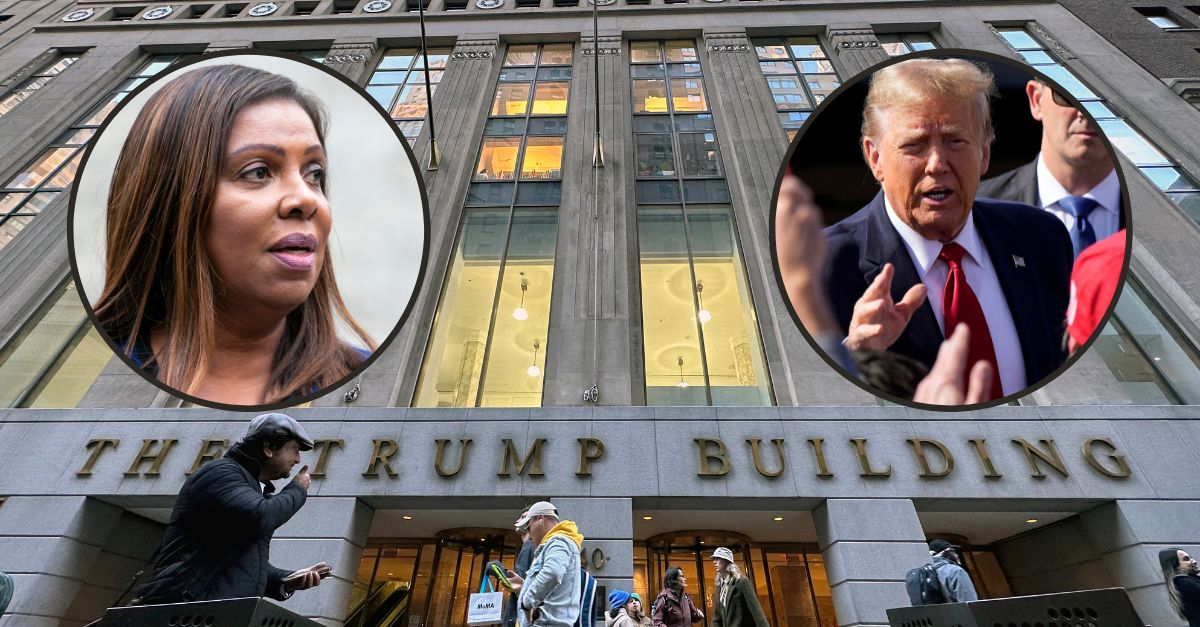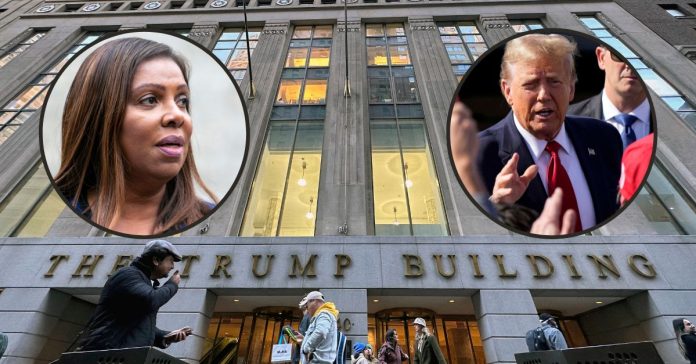
Background: People walk by The Trump Building office building at 40 Wall Street in New York City on Friday, November 3, 2023 (AP Photo/Ted Shaffrey). Inset left: New York Attorney General Letitia James (AP Photo/Ted Shaffrey). Inset right: Donald Trump (AP Photo/Mike Stewart)
New York Attorney General Letitia James knows exactly what to do if former President Donald Trump can’t pay the $354 million civil fraud fine plus interest imposed on him for lying about his companies’ finances for years. Her clue stands 72 stories tall.
“We are prepared to make sure that the judgment is paid to New Yorkers, and yes, I look at 40 Wall Street each and every day,” James said of the 1.3 million square foot Trump Building in Manhattan, according to an ABC News interview with the attorney general this week.
James was interviewed by the outlet a few days after New York State Supreme Court Justice Arthur Engoron ordered Trump to pay the staggering fine and added another $10 million to the total in penalties just for his co-defendants: sons Donald Trump Jr. and Eric Trump and onetime Trump Organization chief financial officer Allen Weisselberg. Weisselberg, 75, was sentenced to five months in prison last month. He pleaded guilty to 15 charges and testified against Trump Organization and Trump Payroll Corp.
The verdict from Engoron came shortly after Trump was ordered by a federal judge in New York to pay $83.3 million in defamation damages to writer E. Jean Carroll.
“If he does not have funds to pay off the judgment, then we will seek judgment enforcement mechanisms in court, and we will ask the judge to seize his assets,” the state attorney general said this week.
Interest is stacking up in the meantime.
The $354 million penalty to Trump alone already carried a $100 million fine in prejudgment interest.
According to Forbes, a little more than $87,000 in post-judgement interest is added to the bill every day until Trump pays up. Mere days after the ruling, Trump already owed $453.5 million once a 9% post-judgment interest rate ordered by Engoron was factored in. Forbes noted the interest had started accruing on penalties assessed in March 2019, May 2022 and June 2023.
Trump has said he will appeal, but even if he does, he will still be forced to fork over the cash and drop it into a court-monitored account.
During trial, the former president frequently described his illegal conduct in New York where he inflated the valuation of his assets a “victimless crime.”
James continues to steadfastly reject that premise, arguing that fraud, including financial fraud, imposes real costs to taxpayers and businesses alike.
“Financial frauds are not victimless crimes. He engaged in this massive amount of fraud. It wasn’t just a simple mistake, a slight, oversight, the variations are wildly exaggerated and the extent of the fraud was staggering,” she told ABC.
If an “average New Yorker” falsified records like Trump did, there is no doubt the “government would throw the book at them,” she said.
James added: “The same should be true for former presidents.”
Have a tip we should know? [email protected]

